Singapore's 4G leadership will be tested by other countries, has to stand its ground, says PM Lee
Prime Minister Lee Hsien Loong spoke about Singapore’s foreign policy challenges and relations with its neighbours, ahead of his May 15 handover of the country’s leadership.
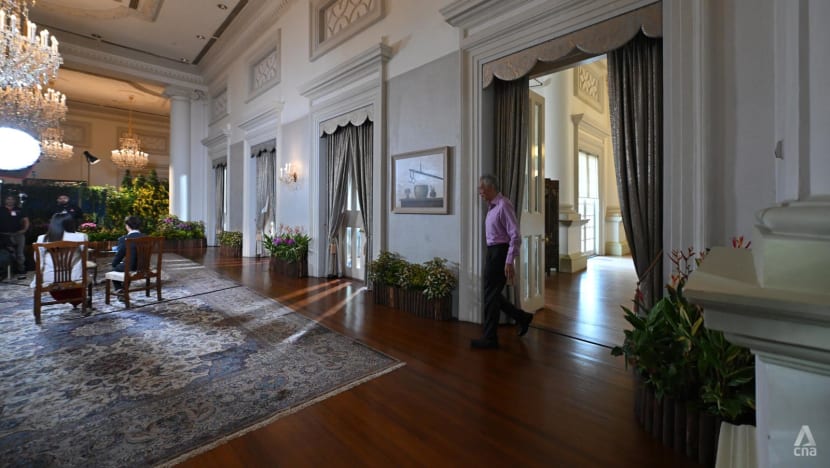

This audio is generated by an AI tool.
SINGAPORE: Singapore will be tested by other countries after its fourth-generation leadership takes over and it will have to be prepared to stand its ground, said Prime Minister Lee Hsien Loong.
In a wide-ranging interview taking stock of his 20-year tenure as prime minister, Mr Lee spoke about Singapore’s foreign policy interests and challenges, and its relations with neighbouring countries.
“People will want to see how the new leaders are, what their policy is and what their personality is. His standing, his strength and support at home, and his ability to engage and to hold his own, and to be somebody to take seriously,” he said of his successor Lawrence Wong.
Mr Lee noted that Mr Wong is “not completely new to this”, as the Deputy Prime Minister has attended many of such meetings with him.
Mr Wong was the principal private secretary to Mr Lee between May 2005 and August 2008, and has also travelled overseas with him after entering Cabinet.
Mr Wong, who is also the Finance Minister, has also been making trips on his own, said Mr Lee.
In October last year, Mr Wong visited the United States, where he met senior officials from the Biden administration.
He visited China later in December, where he co-chaired the Joint Council for Bilateral Cooperation – the highest-level annual forum between the two nations.
Last month, he visited Germany and France, where he called on German Chancellor Olaf Scholz and French President Emmanuel Macron.
Closer to home, Mr Wong has also met with some leaders of the Association of Southeast Asian Nations (ASEAN) countries, said Mr Lee.
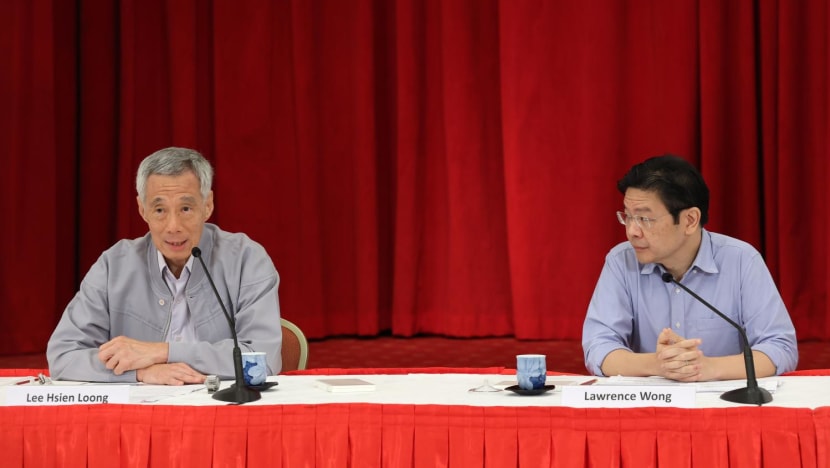
“The new team will be probed certainly. Tested, well, maybe gently. Maybe issues will come and people might push a little bit harder. Or maybe not,” he said.
“But we must expect that some probing will come, and we must be ready to respond. Not in a harsh way, but quietly to stand our ground. And let people know that, you know, we may have had a changing of the guard, but the new guards are prepared, and the old guards are still, giving hopefully useful views to the new team on how to do it.”
DEFINING SINGAPORE’S NATIONAL INTEREST
While foreign policy must be guided by national interest, what constitutes national interest remains a continuing debate, said Mr Lee.
Some considerations include prosperity, safety and security, defending oneself, being able to do business with other countries, and its sovereignty or independence.
“You have national interests in specific things, for example, in access to airspace so that your aeroplanes can fly into Singapore and out of Singapore, or to be able to set your own path and decide whom you want to do business with and what you stand for in the world,” said Mr Lee.
He said that beyond bread-and-butter issues, values and ideals matter too, such as multiracialism, democracy and integrity of the system.
The debate over national interests is not simply about one abstract principle, such as weighing the value of sovereignty versus that of the economy, said Mr Lee.
It becomes more complex when, for instance, one party is probing your maritime boundaries while offering to do business with you, he said.
“Do you get angry? Do you decide to overlook this and then I do business and I lump it? There is no formula answer,” he said, adding that each situation has to be judged on its own and the government will have to make a decision and take a stand.
“Then the people will have a view and the government will have to take that into account. And the government hopefully will have its own considered view and will talk to the population, and we will discuss this.”
Noting that this has always been the approach, Mr Lee cited the example of his 2004 trip to Taiwan about a month before taking office as Singapore’s third Prime Minister.
His trip to the island was private and unofficial. But it caused “a rumpus”, said Mr Lee, pushing him to state his position publicly at his first National Day Rally the following month.
During the rally, seen as Singapore's most important political speech of the year, Mr Lee explained that he visited the island to understand his Taiwanese counterparts’ thinking and the shifts in Taiwanese society, in order to make an objective assessment of the cross-straits situation.
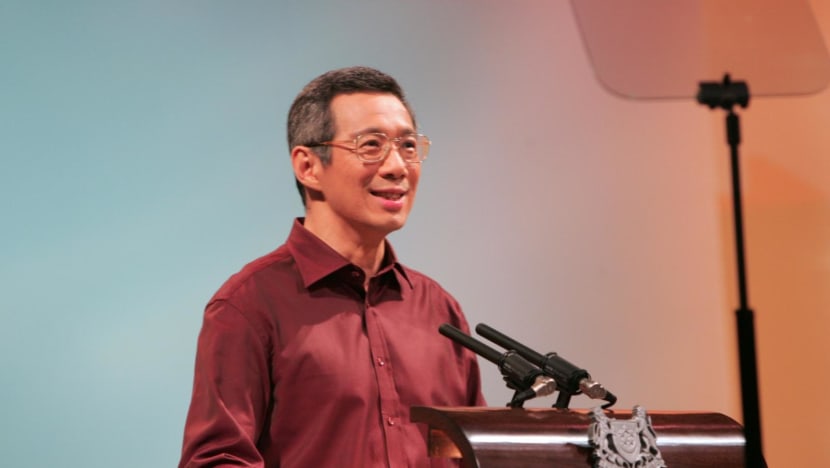
“I had no choice but to make this visit to Taiwan in order to be confident that I can take the right decision for Singapore in a looming crisis,” he said in his speech then.
In the last 20 years, there have been other incidents when Singapore was "tested", and the government has engaged the people through public channels or closed-door sessions to help them understand the situation, said Mr Lee.
COUNTERING EXTERNAL INFLUENCE
Foreign players and actors seeking to influence Singapore is not new, said Mr Lee, with known black operations taking place here as early as the 1960s and 1970s.
Some were done through the media, with cases involving the Eastern Sun, Singapore Herald and Chinese newspapers.
Others used “political individuals, people in opposition, politicians in Singapore to spout their messages and to try and influence Singaporeans in those days”, he said.
“But what is new is that they are now on our doorstep and in our bedroom because of the internet, because of social media, because of Singaporeans travelling. And now also because of AI (artificial intelligence). It is so much easier to generate stuff and to persuade people or mislead people.”
To address this threat, Singapore has passed the Foreign Interference (Countermeasures) Act (FICA) as one way to deal with foreign hostile influence, said Mr Lee.
The hostile influence of individuals or organisations who speak up on behalf of the foreign actor and participate in local politics is something that is "dangerous" and "not hard to do", said Mr Lee.
Under FICA, individuals can be designated as "politically significant persons" (PSP) if their activities are directed towards a political end, and it is in the public interest for the authorities to apply countermeasures.
“It means you either have a nexus to Singapore politics – you are politically active and/or you are supporting some political party – or you have a nexus to some foreign actor. So if you have a nexus to some foreign actor, you may not be politically active, but you could become politically active and become a player and a problem,” said Mr Lee.
Even if someone is a political actor without foreign links currently, they are vulnerable to being approached by foreign actors and could become a threat later, he added.
In February this year, Singaporean businessman Chan Man Ping Philip became the first person to be designated as a PSP after the provisions came into force in December last year.
The 59-year-old, who was from Hong Kong and became a naturalised Singapore citizen, had “shown susceptibility to be influenced by foreign actors, and willingness to advance their interests”, said the Ministry of Home Affairs.
Mr Chan heads the Hong Kong Chamber of Commerce in Singapore and has been the president of the Kowloon Club since 2011. He is also the managing director of three property firms. He had also been involved in grassroots and fundraising efforts in Singapore for over a decade, but has since stepped down from all grassroots appointments.
Mr Lee said designating someone as a PSP is helpful as it raises awareness that “he is not just an innocent third party advocate who believes deeply in what he says and is putting that view forth”, and instead has deeper connections.
“Secondly, it makes it harder for somebody, some foreign actor, to influence him. Because if you put him onto your distinguished advisory committee, he has to declare and that diminishes his value to you.”
The provision also allows PSPs to declare that they do not have any foreign connections and are not doing anything wrong, he added.
Cabinet ministers and Members of Parliament, including Nominated MPs, automatically become PSPs. The People’s Action Party, as a party, is also a PSP.
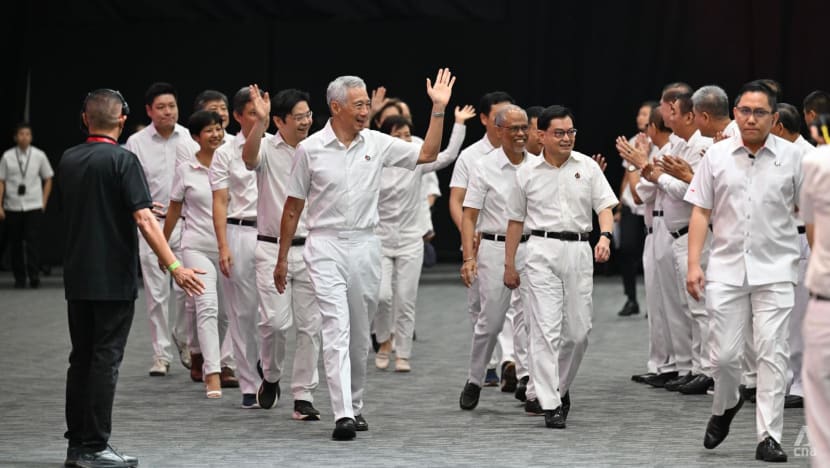
“And if you declare falsely, then of course many consequences will follow,” Mr Lee said.
He highlighted that being declared a PSP does not necessarily mean that the individual has done anything wrong, but “it is just to put everybody on notice”.
FOREIGN EVENTS ON OUR DOORSTEP
In today’s world, issues unfolding abroad also hit closer to home due to social media, said Mr Lee.
“It is a reality of our society, that compared to 20 or 30 years ago, compared to before, when the outside could be far away, today the outside is on your doorstep.”
In a previous generation, if a war broke out in the Middle East, for instance, Singaporeans may not really have known much about what was going on.
“You may read about it in the Berita Harian, and some reports, but really, you did not get the feel, the smell of the fear and the anger and the passion which is there. But today you see it. You see it on TikTok, you see it on your WhatsApp groups, you see people discussing it with one another,” said Mr Lee.
“You see it also when you get a clip come your way and you do not know whether this came from Gaza or from Chechnya, or maybe it came from somewhere else altogether, nothing to do with it. But you send it to your friends and then everybody gets worked up.”
Mr Lee said he understands how Muslims here are distressed by what is happening in Gaza, calling it unconscionable and inhuman.
While the Palestinian-Israeli conflict is not about religion, Mr Lee noted that religion is nonetheless an element fuelling the emotions.
“You talk about Al-Aqsa Mosque, Jerusalem, and here there is a religious identification. So the Muslims feel much more strongly about this, generally speaking, than the non-Muslims in Singapore,” he said.
“I think others too, young Singaporeans, they are worked up, but I would say if you are Muslim, that is an extra factor which makes sure you are very, very engaged.”
He said Singaporeans have to work together to acknowledge those feelings, but also provide help in a manner that is practical and not just performative.
“I can strike pose, say this and that, have a demonstration, burn flags. It is cathartic, but does it help people who desperately need help?”
Instead, Singapore has arranged donations, with the Singapore Red Cross delivering them to Egypt, and also collected and airdropped food and medical necessities over Gaza to help the population with their urgent needs.
In November last year, Singapore handed over S$2 million (US$1.47 million) in public donations for humanitarian assistance to civilians in Gaza, to the United Nations Relief and Works Agency for Palestine Refugees in the Near East in Cairo.
The Republic of Singapore Air Force (RSAF) over a two-week deployment in March airdropped over 20 tonnes of food supplies – equivalent to more than 59,000 meals – into the enclave from a C-130 transport aircraft.
Mr Lee added that Singapore has to take an official stand on the issue too and make its views known.
“So we have taken that stand, first at the UN where we voted for the ceasefire resolutions at the General Assembly repeatedly,” he said.
“Secondly, parliamentary statements and government statements, and make clear what we stand for, what we approve of, what we condemn.”
RELATIONS WITH IMMEDIATE NEIGHBOURS
Singapore has been lucky that relations with its immediate neighbours, Malaysia and Indonesia, have been “generally good”, said Mr Lee.
He said he has worked with a succession of Malaysian prime ministers, and both sides have had good discussions and made progress whenever issues came up.
Malaysia’s fifth prime minister Abdullah Badawi, who ruled from 2003 to 2009, was in office when the Pedra Branca judgment at the International Court of Justice was published, recalled Mr Lee.
Pedra Branca is located near the eastern entrance of the Singapore Strait, about 44km east of mainland Singapore. The dispute dates back to 1979, when Malaysia published a map indicating that the island was within its territorial waters.
In 2008, the ICJ ruled that Pedra Branca belongs to Singapore while Middle Rocks belongs to Malaysia.
“I talked to him and we decided we would both accept this and now we should move on and talk about the next stage – now the land is settled, what about the maritime borders? So we talked about maritime delimitation. We made progress,” said Mr Lee.
“But of course, it takes time, and we are still discussing the maritime delimitation until today.”
When Najib Razak took over in 2009, both sides wanted to settle the issue of the Malaysia-Singapore Points of Agreement of 1990, which involved Malayan Railway land in Singapore, said Mr Lee.
It resulted in a land swap, which has seen the creation of the Rail Corridor and redevelopment of the former Tanjong Pagar Railway Station site, he said.
The new Cantonment MRT station, part of a project to close the Circle Line loop between Harbourfront and Marina Bay, is built under the site and set to open in 2026.
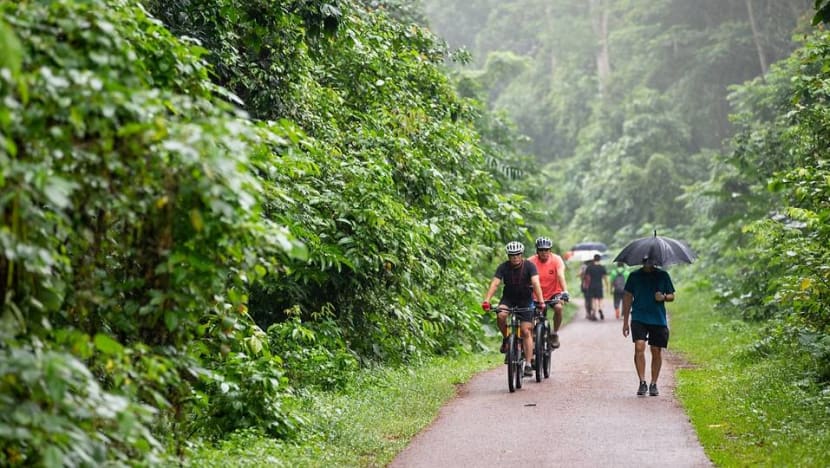
The Marina One development in Marina South and DUO in Bugis are also part of the deal, with both projects jointly developed by Temasek and Khazanah, the Malaysian government’s strategic investment fund, said Mr Lee.
“I made Najib a generous offer to settle. He looked at it, he agreed. We went into the joint development. I think both sides are very happy, and both sides made money from the development,” he said, adding that it took 20 years to reach such an agreement.
Current leader Anwar Ibrahim, who was sworn in as Malaysia’s 10th prime minister in November 2022, is a familiar face to Mr Lee.
“I have met him many times. Since a very long time ago, even back in the 90s, so we know each other very well,” he said.
Part of the significant cooperation between both sides moving forward is the Johor Bahru-Singapore Rapid Transit System (RTS) Link, which is expected to be completed by end-2026, said Mr Lee.
In January, Mr Lee and Mr Anwar met to mark the completion of the 4km rail link’s “drop-in span” which connects both countries’ sides of the viaduct.
They also witnessed the signing of a Memorandum of Understanding on a new Johor-Singapore Special Economic Zone. It will see both sides work towards boosting the cross-border flow of goods and people and create a full-fledged agreement on the zone, and the facilitation of renewable energy cooperation between Malaysia and Singapore.
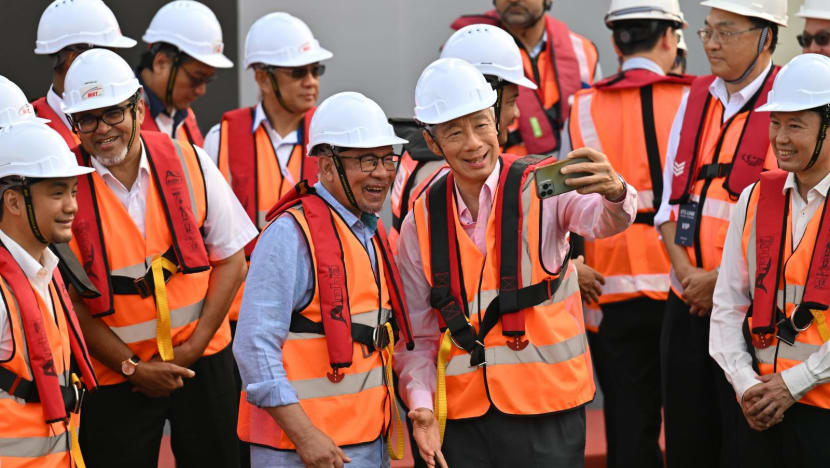
Mr Lee said both sides are now discussing other issues, which “can be cooperative but also sensitive”, including airspace, maritime boundaries and water.
“These are things which need to be discussed. We have not settled them. So, there is work to be done by my successor,” he said.
Mr Lee recalled that the swearing-in ceremony of former Indonesian president Susilo Bambang Yudhoyono – one of two Indonesian presidents he has worked with as prime minister – was his first or second overseas visit after taking office.
In his term, Singapore and Indonesia signed three agreements, on airspace, military training and extradition.
“In fact, I remember vividly we went to Bali and had all the ministers there and we settled the agreement. But it could not follow through, the politics was difficult,” he said,
“Then when Jokowi came in, he wanted to have another stab at it, and so did I. So, we decided to press the matter.”
Current Indonesian President Joko Widodo, popularly known as Jokowi, took office in October 2014.
Mr Lee shared that he tasked Senior Minister and Coordinating Minister for National Security Teo Chee Hean to lead Singapore’s negotiations, with Indonesia represented by Coordinating Minister for Maritime and Investment Affairs Luhut Pandjaitan and Defence Minister Prabowo Subianto.
“And happily, they settled it, and we signed it two years ago. It was ratified last year, and it has come into effect this year,” said Mr Lee.
He met Mr Jokowi for their final Singapore-Indonesia Leaders’ Retreat in the city of Bogor last month. While the Singaporean leader will hand over to his deputy on May 15, Mr Jokowi will pass the leadership reins to Defence Minister Prabowo in October.
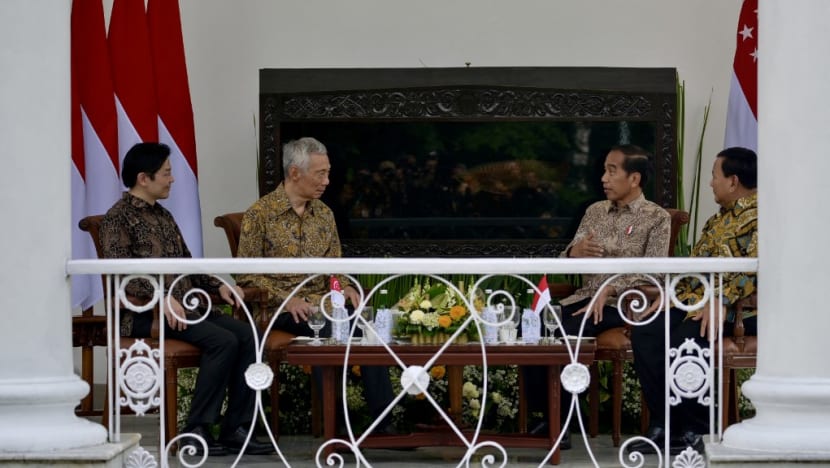
Mr Lee said Singapore’s relationships with both Malaysia and Indonesia “will always be complicated”.
“Nearest neighbours, permanently nearest neighbours; you have to work together, and yet there are always so many places where you can easily have different perspectives or rub up against each other,” he said.
“And I think we both know that, and both try our best not to collide, because we can do many things together.”
VALUE OF ASEAN
ASEAN is a cornerstone of Singapore’ foreign policy and is a “raft which we are connected to”, said Mr Lee of the regional bloc.
“It works by consensus. We have a wide range of cooperation. Every year, they have about six or seven hundred meetings of different kinds, big and small. The leaders meet twice a year, sometimes once, but very intensively,” he said.
In November 2022, ASEAN agreed “in principle” to admit Timor-Leste as the 11th member state. The country will be granted observer status at ASEAN meetings, including at summit plenaries.
Mr Lee said the habit of working together has been valuable in helping ASEAN countries understand each other and find common ground on issues.
“Because it is consensus, the progress is often not as quick as we would like, but it is a very important platform for cooperation and also for wider cooperation with the wider region.”
He highlighted the bloc’s forums with partner countries like America, China, Japan, Russia, India and Australia, across platforms such as the East Asia Summit and the ASEAN Plus Three.
Although such meetings take lots of energy and time, it is necessary diplomacy in maintaining ASEAN centrality. This means placing the bloc “as the centre which provides a platform where many regional discussions can take place on economy, on security, on climate, even international cooperation”, explained Mr Lee.
“ASEAN benefits from a stable, secure region and ASEAN helps contribute to a stable and secure region. That is very important because it is key to Singapore, especially as a small country. It is something which we have enjoyed now for 30, 40 years,” he said.
Such an arrangement has seen people in the region largely going about life as usual after the Vietnam War and Cambodian War ended decades back.
Moving forward, however, such regional peace and stability is not assured, amid tensions between the big powers, economic and technological bifurcation, and tensions in other parts of the world that impact this region, said Mr Lee.
“Are we absolutely sure that for the next 20 years, there would be no war? I think the answer is, we cannot be absolutely sure. It could happen, probably not, but things can go wrong.”
He said it would take just a miscalculation for the region to find itself in an unintended and dangerous situation.
Quoting former Indonesian president Suharto, Mr Lee said that “regional resilience is as important as national resilience”.
“Regional resilience for Southeast Asia means ASEAN. We have to keep on building this up, contributing to it and playing our part, even though we are a very small member of ASEAN,” he said.


























